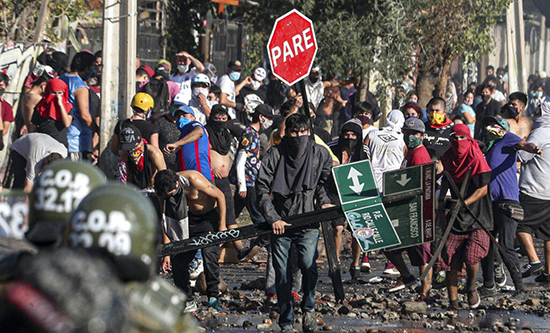
Chile faces a coronavirus disaster: rates of infection remain out of control, and threaten to overwhelm hospital services. Mismanagement of the pandemic by the neoliberal government of President Pinera lie at the root of this: a belated total lockdown of the capital Santiago in the middle of May sparked food riots in the working class neighbourhood of El Bosque.
4,000 new cases are being report daily, of which an estimated 15% require hospitalisation. 95% of the 2,400 intensive care beds available are occupied even though capacity has been doubled since the start of the pandemic; Chile has the second fewest hospital beds per head of population among OECD member countries. The country currently has the third most cases in Latin America after Brazil and Peru, with 118,000; 80% are in Santiago where a third of Chile’s 18 million inhabitants live.
The government’s response has been tardy and was initially focused on measures targeting the huge protest movement that peaked with two million marching through the streets of Santiago on International Working Women’s Day, 8 March. On 18 March, Pinera declared a 90-day state of emergency, and four days later imposed a 10pm to 5am curfew across the country. Graffiti and posters from the protests were cleared from Plaza Italia, the assembly point for the massive protests that had taken place over the previous months. Yet there was no attempt to impose any nation-wide lockdown; those that took place were organised on a municipality basis.
In mid-April, Pinera announced various pitiful one-off benefit payments to the poorest Chilean families, hoping to buy social peace. These included a Single Family Subsidy of 50,000 Chilean pesos (£50) per family dependant; and a further 50,000 Chilean pesos per family for 750,000 of the poorest households. This was a miserable gesture to those families where breadwinners have been summarily sacked as a result of the pandemic: Chile has hardly any employment rights. This left hundreds of thousands of Chilean close to starvation, and three days into the total lockdown of Santiago, on 20 May, El Bosque exploded. Troops with armoured cars were sent in to suppress the riots which went on for two nights; Pinera announced the distribution of food baskets to 2.5 million families, and an Emergency Family Income scheme, again for the poorest families. This will involve monthly payments over three months starting 10 June ranging between 260,000 and 345,000 Chilean pesos initially (£260-£350), but falling to 85% of this level on the second payment, and 70% on the third.
Ironically, LATAM airline, the largest in South America, and the basis for billionaire Pinera’s personal fortune, has filed for Chapter 11 bankruptcy in the US, having laid off 1,400 workers earlier in May. With predictions of up to 20% unemployment post-pandemic, and no progress in stemming it at present, Chile remains on the edge of a social explosion. The Chilean ruling class will demand austerity – and the people will not accept it.
Robert Clough




